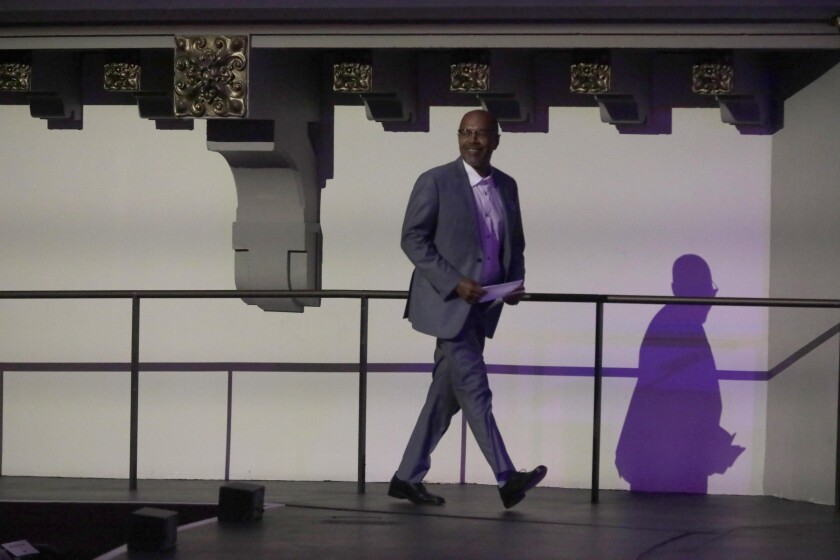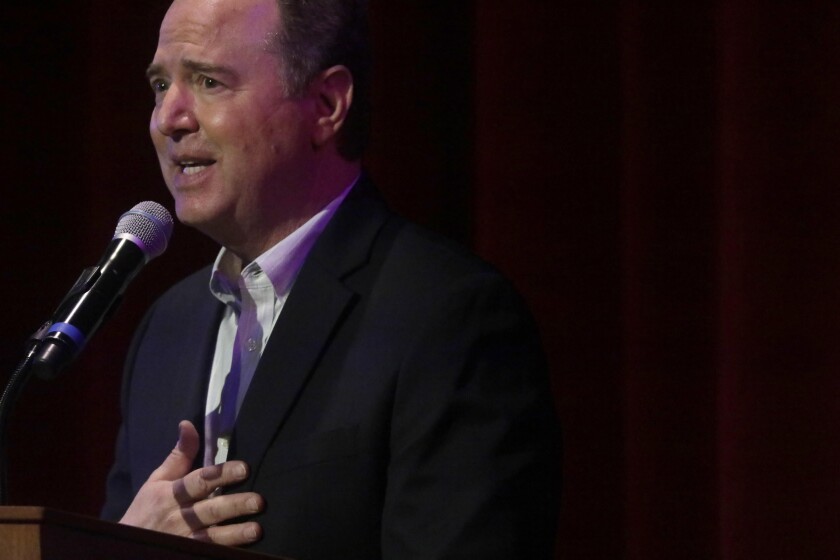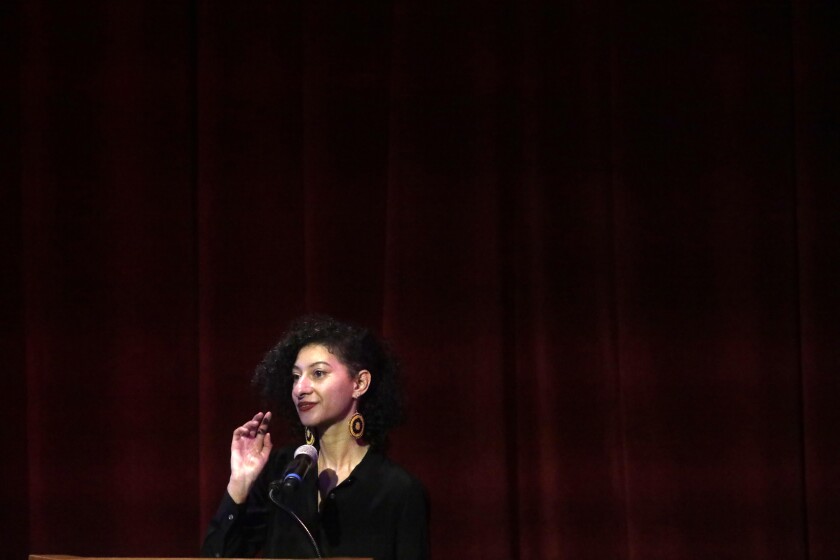For the first time in three years, writers, editors, journalists and bibliophiles gathered Friday night at USC’s Bovard Auditorium for a live, in-person ceremony to unveil the winners of the 42nd Los Angeles Times Book Prizes.
Clad in dresses, blazers and more casual attire, they watched as novelist Véronique Tadjo, poet Diane Seuss, Rep. Adam B. Schiff, bestselling author Paul Auster and others accepted awards — in person and via video — for outstanding literary works published last year. The annual event, which kicks off the Festival of Books, celebrates the best of the written word, from new and emerging voices to authors celebrating a lifetime of contributions to literary culture.
Poets Tyehimba Jess, Cyrus Cassells and Adriana Ramirez also took to the stage throughout the night to read poems by poetry finalists Seuss, Rita Dove, CM Burroughs, Martín Espada and Mai Der Vang.

Times Executive Editor Kevin Merida walks on stage to make the opening remarks at the LA Times Book Prizes.
(Genaro Molina/Los Angeles Times)
The event was hosted by Julia Turner, Times managing editor of arts and entertainment, and featured remarks by Executive Editor Kevin Merida, books editor Boris Kachka and many others.
“Books are a gateway to possibility,” Merida said in his opening remarks. “They help us dream and think, love and laugh, and cry when we need to. Books power our imagination, taking us to distant places, ancient kingdoms, to planets not yet discovered. Those of us who write them, which is to say all of our finalists and others in this auditorium, help us see the world and one another more clearly … so thank you, writers, for your gift, for the time and genius you put into your craft.”
Congressman Schiff (D-Burbank) was awarded the current interest prize for “Midnight in Washington: How We Almost Lost Our Democracy and Still Could,” an inside look at Donald Trump’s presidency and the Republicans who enabled him. Judges called Schiff’s personal narrative “brilliant, sobering, and unforgettable.”
On stage, Schiff said he picked the title “Midnight in Washington” because midnight is the day’s darkest hour and a time of hope, “because we know that what follows will be filled with light… We all have a role in the preservation of our democracy, our cherished legacy. Halfway around the world, Ukrainians are fighting and dying to preserve their sovereignty, territorial integrity and their democracy. What we are asked to do is so much less, and yet our democracy is also at risk. So let’s do our part.”
Jackie Polzin took home the Art Seidenbaum Award for First Fiction for her novel “Brood,” about a woman’s efforts to keep her chickens alive after a recent loss. “Brood” was shortlisted for the 2021 Center for Fiction First Novel Prize, among others. Judges praised Polzin for offering “something very rare in life or art: the feeling of life itself, of being alive, being cared for and caring for life.”

“We all have a role in the preservation of our democracy,” said Rep. Adam Schiff, winner of the current interest award.
(Genaro Molina/Los Angeles Times)
In her speech, Polzin thanked, among others, Joy Williams, who read an early manuscript of the book and in a letter asked to read the rest when it was finished. “Joy also said in that letter, ‘Now, just make it a bit more moving and profound.’ Thank you, Joy, I really tried my best.”
Also celebrated were three previously announced honorees: Deborah Levy, winner of the Christopher Isherwood Prize for Autobiographical Prose for her memoir “Real Estate: A Living Autobiography”; Reginald Dwayne Betts, who took home the Innovator’s Award for his work with Freedom Reads, an organization that supports reading in prisons; and Luis J. Rodriguez, “the poet laureate of the barrio” and recipient of the Robert Kirsch Award for lifetime achievement.
“A lifetime achievement?” asked Rodriguez on stage in his opening remark. “I’m still at it.” The audience laughed.
Through tears, Rodriguez dedicated much of his speech to his mother, a “working-class Mexican” who never fulfilled the greatness she was capable of. A practical, hard-working woman, she believed writing was a waste of time. “And you know what, I get it,” he admitted to the laughing crowd.

East L.A.-born Dr. Chanda Prescod-Weinstein accepts the award for science & technology.
(Genaro Molina/Los Angeles Times)
But before she died, she told him: “I had a hard time with you, but I respected that you did what you believed in and you did what you wanted to do.”
“And she always supported that,” he said. “And that’s what I want to say to everybody: Don’t stop that dream. Re-dream that world. Make it your world. I believe that everybody has the goodness and decency to support anybody that wants to be writer, an artist, a dancer, a thinker, whatever it is, that we can make a world where they’re embraced and loved for who they were meant to be. ”
Zen Cho won the Ray Bradbury Prize for Science Fiction, Fantasy and Speculative Fiction with “Spirits Abroad,” a story collection that weaves between the lands of the living and the dead. Judges commended the stories for their imagination, tenderness, joy and play. “During the past two years, for many of us, the world has felt harder than ever to exist in,” they said in a citation. “‘Spirits Abroad’ gave this judging panel a much-needed adventure.”
East L.A.-born Chanda Prescod-Weinstein was awarded in the science-and-technology category for “The Disordered Cosmos: A Journey Into Dark Matter, Spacetime, and Dreams Deferred,” which lays out a more inclusive approach to studying science and examining its impact on society. “I wrote this book partly because I wanted to say the cosmos belongs to all of us,” she said in her speech. “Y la lucha sigue.” And the fight continues.
The fiction prize went to Tadjo, whose novel “In the Company of Men” was inspired by real accounts of the Ebola epidemic that devastated West Africa. The book “is unlike anything we’ve ever read,” judges said, calling it “gripping and prescient.”
In poetry, Seuss won for her National Book Critics Circle Award-winning “frank: sonnets,” an “allusive, haunting, kaleidoscopic, and life-encompassing” collection, according to the judges’ panel. “To the poets out there chipping away at their craft, sometimes with minimal recognition, remember to be led by the poem, not the poem’s product,” she said in her closing remarks. “To be seen, heard and supported at this point in my life is a beautiful thing, but even more important is the making of the poem itself, and beyond that, the mystery that lurks behind it, and even lives past it.”
Ada Ferrer received the history prize for “Cuba: An American History,” a sweeping chronicle of the island nation and its complex relationship to the United States that she wrote, she said in her speech, so her Cuban parents could see themselves reflected in a history book. Auster, better known for his cerebral novels, took home the biography award for “Burning Boy: The Life and Work of Stephen Crane,” about the short-lived American author of “The Red Badge of Courage.”
In the graphic novel/comics category, R. Kikuo Johnson won for “No One Else,” a story that captures a family in the aftermath of loss. Megan Abbott won the mystery/thriller award for “The Turnout,” a creepy tale of competition and family ties.
Rita Williams-Garcia won in young-adult literature for “A Sitting in St. James,” which weaves among the lives of people living on a plantation before the American Civil War.
After the two-hour ceremony, prize winners, finalists and guests drank, ate and mingled inside the Town and Gown ballroom for the afterparty.
Abbott and S.A. Cosby, a 2021 Book Prize winner and finalist this year, stood near the bar talking about the movies that have inspired their work, alcoholic drinks in hand. It’s exactly how they planned to celebrate.
“The set of nominees is so dazzling to me,” said Abbott of her win. “They’re writers I admire so much and their books I swallowed. Particularly after not having an in-person event, it’s felt triply glorious to be in L.A. and to be talking about books. Winning was icing on the cake, but I was already so in.”
Cosby gushed over his friend’s recognition.
“I’m so ecstatic for her to win,” he said. “She has deserved this type of adulation and award for a long, long time.” Cosby, who was visiting L.A. for the first time, was also retroactively celebrating his win from last year. “To be here now is an accomplishment, never mind winning. I grew up really poor, raised by a single mother in a mobile home in the middle of southeastern Virginia… and to be here, that my words brought me to the L.A. Times Book Festival… it’s beyond my wildest dreams.”
Nearby, Johnson constructed meat and vegetable tacos on his plate before relocating the other finalists in the graphic novels/comics category. He was still shocked by his win, he said, and couldn’t remember a word from his speech, but when asked how he planned to celebrate, his answer came easy: “I want a few drinks and some tacos. I couldn’t really ask for more. Those are two of my favorite things in any circumstance, and to do it with my award as a food tray is even better.”
See the full list of finalists below.
Biography
John Tresch, “The Reason for the Darkness of the Night: Edgar Allan Poe and the Forging of American Science”
Mark Harris, “Mike Nichols: A Life”
Nick Davis, “Competing With Idiots: Herman and Joe Mankiewicz, A Dual Portrait”
Paul Auster, “Burning Boy: The Life and Work of Stephen Crane”
Rebecca Donner, “All the Frequent Troubles of Our Days: The True Story of the American Woman at the Heart of the German Resistance to Hitler”
Fiction
Claire Vaye Watkins, “I Love You but I’ve Chosen Darkness”
Joy Williams, “Harrow”
Mariana Enriquez, “The Dangers of Smoking in Bed,” translated by Megan McDowell
Saïd Sayrafiezadeh, “American Estrangement”
Véronique Tadjo, “In the Company of Men”
Graphic novel/comics
Ann Xu and Hiromi Goto, “Shadow Life”
Keum Suk Gendry-Kim, “The Waiting,” translated by Janet Hong
Lee Lai, “Stone Fruit”
Michael DeForge, “Heaven No Hell”
R. Kikuo Johnson, “No One Else”
History
Ada Ferrer, “Cuba: An American History”
Alaina E. Roberts, “I’ve Been Here All the While: Black Freedom on Native Land”
Mae Ngai, “The Chinese Question: The Gold Rushes and Global Politics”
Mia Bay, “Traveling Black: A Story of Race and Resistance”
Olivette Otele, “African Europeans: An Untold History”
Mystery/thriller
Alison Gaylin, “The Collective”
Megan Abbott, “The Turnout”
Michael Connelly, “The Dark Hours”
S.A. Cosby, “Razorblade Tears”
Silvia Moreno-Garcia, “Velvet Was the Night”
Poetry
CM Burroughs, “Master Suffering”
Diane Seuss, “frank: sonnets”
Mai Der Vang, “Yellow Rain”
Martín Espada, “Floaters”
Rita Dove, “Playlist for the Apocalypse”
Science and technology
Chanda Prescod-Weinstein, “The Disordered Cosmos: A Journey Into Dark Matter, Spacetime, and Dreams Deferred”
Emma Marris, “Wild Souls: Freedom and Flourishing in the Non-Human World”
Katharine Hayhoe, “Saving Us: A Climate Scientist’s Case for Hope and Healing in a Divided World”
Meghan O’Gieblyn, “God, Human, Animal, Machine: Technology, Metaphor and the Search for Meaning”
Scott Weidensaul, “A World on the Wing: The Global Odyssey of Migratory Birds”
The Art Seidenbaum Award for First Fiction
Benjamín Labatut, “When We Cease to Understand the World,” translated by Adrian Nathan West
Jackie Polzin, “Brood”
Jocelyn Nicole Johnson, “My Monticello”
Natasha Brown, “Assembly”
Thomas Grattan, “The Recent East”
The Ray Bradbury Prize for Science Fiction, Fantasy & Speculative Fiction
Mariana Enriquez, “The Dangers of Smoking in Bed,” translated by Megan McDowell
Marissa Levien, “The World Gives Way”
Rivers Solomon, “Sorrowland”
Ryka Aoki, “Light From Uncommon Stars”
Zen Cho, “Spirits Abroad”
Young adult literature
Darcie Little Badger, “A Snake Falls to Earth”
Kekla Magoon, “Revolution in Our Time: The Black Panther’s Promise to the People”
Malinda Lo, “Last Night at the Telegraph Club”
Paula Yoo, “From a Whisper to a Rallying Cry: The Killing of Vincent Chin and the Trial That Galvanized the Asian American Movement”
Rita Williams-Garcia, “A Sitting in St. James”
Current interest
Andrea Elliott, “Invisible Child: Poverty, Survival and Hope in an American City”
Heather McGhee, “The Sum of Us: What Racism Costs Everyone and How We Can Prosper Together”
Reuben Jonathan Miller, “Halfway Home: Race, Punishment, and the Afterlife of Mass Incarceration”
Evan Osnos, “Wildland: The Making of America’s Fury”
Adam Schiff, “Midnight in Washington: How We Almost Lost Our Democracy and Still Could”

